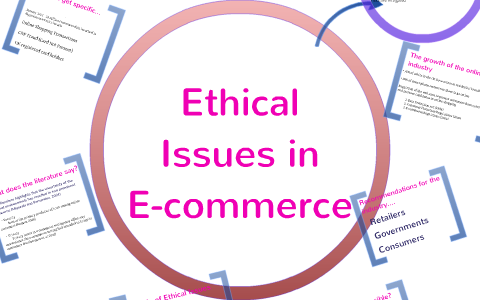Ethical Considerations in E-Commerce

Ethical considerations in e-commerce encompass a range of principles and practices aimed at promoting fairness, transparency, trust, and accountability in online transactions. Here are some key ethical considerations in e-commerce:
Consumer Privacy: E-commerce businesses must respect and protect consumer privacy by implementing robust data protection measures and adhering to applicable privacy regulations, such as the General Data Protection Regulation (GDPR) in the European Union. Collecting, storing, and processing customer data should be done transparently and with explicit consent, and businesses should safeguard against unauthorized access, data breaches, and misuse of personal information.
Transparency and Disclosure: E-commerce businesses should provide clear and accurate information about products, pricing, shipping costs, and terms of service to consumers. Transparency in pricing, including any additional fees or charges, helps build trust and prevents deceptive practices such as hidden fees or bait-and-switch tactics.
Customer Trust and Security: E-commerce businesses have a responsibility to ensure the security of customer transactions and protect against fraud, hacking, and other cybersecurity threats. Implementing secure payment processing systems, encryption technologies, and multi-factor authentication can help safeguard customer data and instill confidence in online transactions.
Fair Business Practices: E-commerce businesses should conduct themselves ethically and adhere to fair business practices in their interactions with customers, suppliers, and competitors. This includes refraining from deceptive advertising, unfair pricing practices, or monopolistic behavior that could harm consumers or stifle competition.
Customer Service and Support: Providing responsive and accessible customer service is essential for building trust and resolving issues that may arise during the online shopping experience. E-commerce businesses should offer timely assistance, address customer inquiries and complaints promptly, and strive to exceed customer expectations in terms of service quality and support.
Supply Chain Ethics: E-commerce businesses should consider the ethical implications of their supply chain practices, including sourcing materials, manufacturing processes, and labor conditions. Ensuring ethical sourcing, fair labor practices, and environmental sustainability throughout the supply chain can help minimize negative social and environmental impacts and align with consumers' values.
Accessibility and Inclusivity: E-commerce websites should be accessible to all users, including those with disabilities, by adhering to web accessibility standards and guidelines, such as the Web Content Accessibility Guidelines (WCAG). Ensuring that websites are navigable, readable, and usable for individuals with diverse needs promotes inclusivity and equal access to online shopping opportunities.
Environmental Impact: E-commerce businesses should consider the environmental impact of their operations, including packaging materials, shipping methods, and carbon emissions. Adopting sustainable practices, such as eco-friendly packaging, energy-efficient logistics, and carbon offsetting initiatives, can help mitigate environmental harm and contribute to a more sustainable future.
Social Responsibility: E-commerce businesses have a role to play in addressing social issues and contributing to the well-being of communities. This may involve supporting charitable causes, engaging in corporate social responsibility (CSR) initiatives, or giving back to the communities they serve through philanthropy or volunteerism.
Ethical Use of Technology: E-commerce businesses should consider the ethical implications of emerging technologies, such as artificial intelligence (AI), machine learning, and data analytics, in their operations. This includes ensuring fairness, accountability, and transparency in algorithmic decision-making, protecting against bias and discrimination, and respecting user privacy and autonomy.
By embracing ethical considerations in e-commerce, businesses can build trust with customers, foster long-term relationships, and contribute to a more sustainable and responsible digital economy. Ethical behavior not only benefits consumers and society but also strengthens the reputation and resilience of e-commerce businesses in an increasingly competitive marketplace.
Thank you,